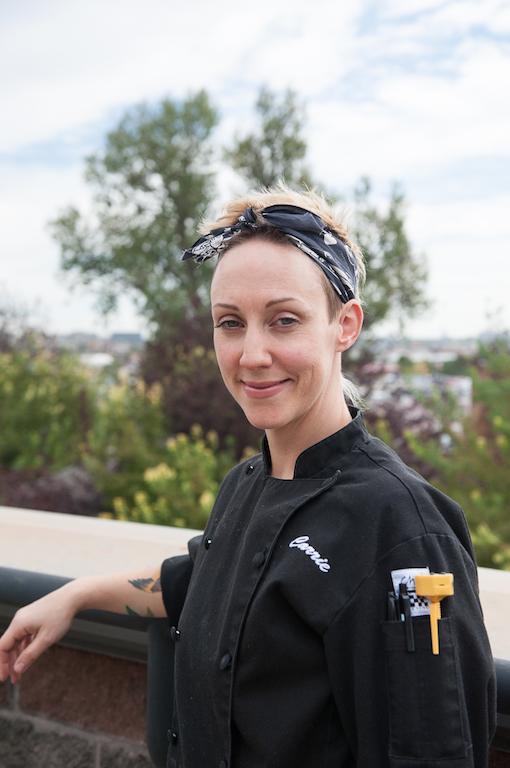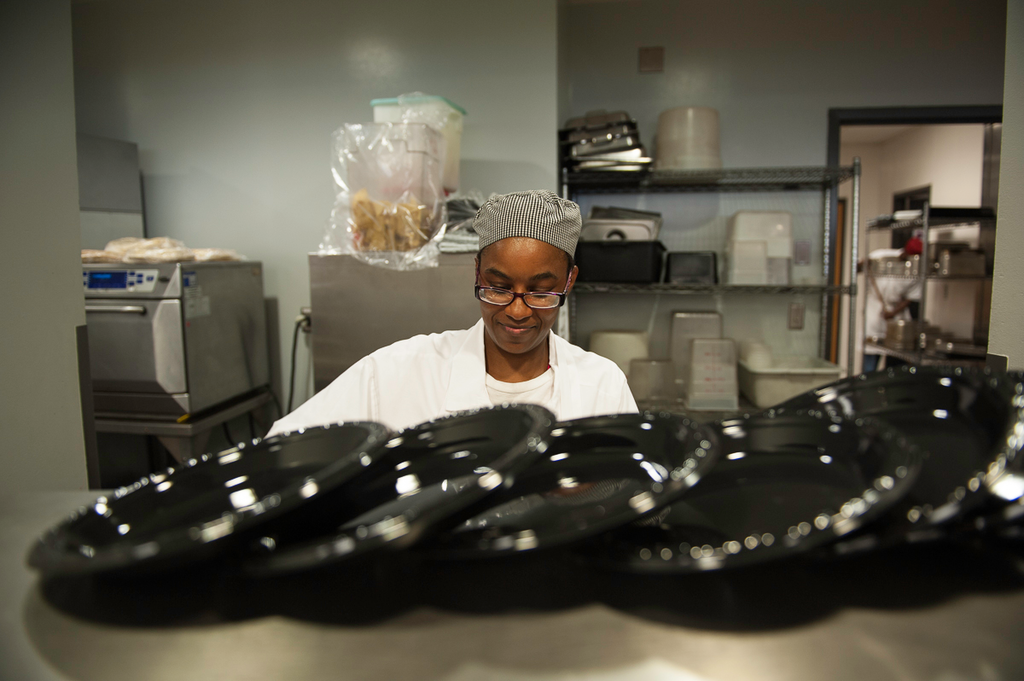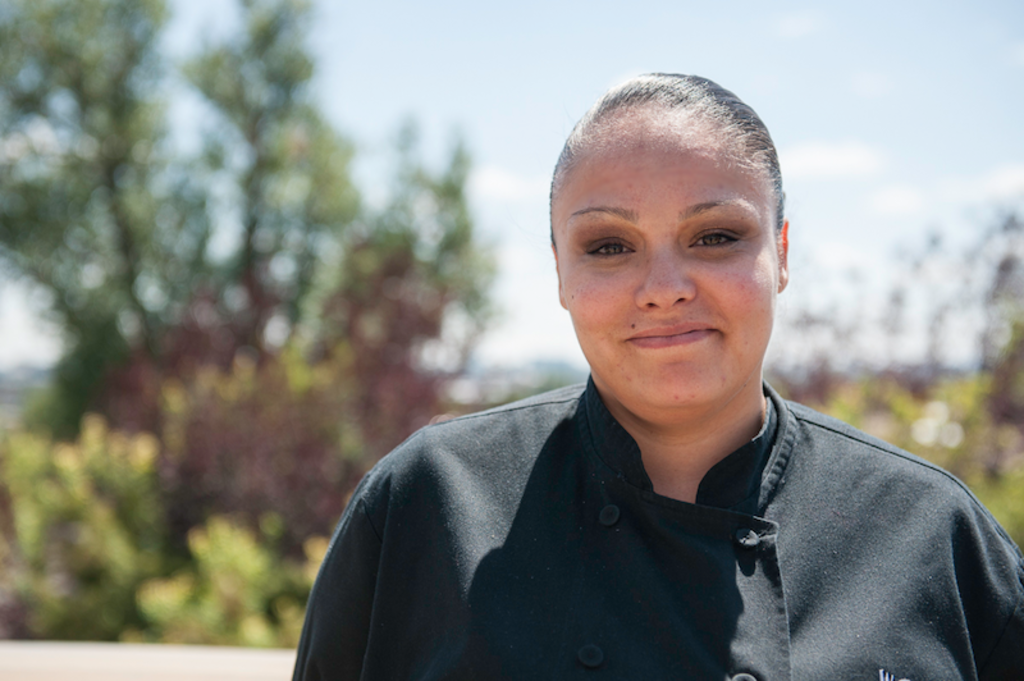Carrie Shores was always a natural in the kitchen. Growing up, even when she was living on government-rationed food— stuff she called “inedible”— her sister would drool over her every creation. “She would eat anything I made,” explained Shores. “I taught myself how to make my grandmother’s beef stew. I really remember one time perfecting it… my sister would eat bowls of it.”
It’s no surprise that with this inherent talent, Shores, now 38, would later become a chef—and an accomplished one, too. Long known as a “super taster” by her friends and family, she was able to pursue her calling at 19 by moving to the Bay Area to receive an education at the California Culinary Academy. After her schooling, she hit a major landmark in her career when she landed a job at the posh A16—one of the best restaurants in San Francisco. Working in the heart of the metropolis, she endured long nights and grueling shifts as a line cook. It was intense. But she loved it.
“Absolutely everything about it was amazing, I loved the restaurant, I loved the food, I loved Nate Appleman, the chef at the time, and while it was the hardest job I’ve ever had, it was also one of the most eye-opening, intense experiences I’ve ever had; it was just balls to the walls,” she said in an interview with Westword in 2013.
After cutting her teeth on the coast, she eventually returned to Denver, the city where she spent her adolescence. Starting as a pantry chef at Table 6, Shores was once again in the thick of it, living on the high of a dinner rush. She was a dedicated worker, and a talented cook. Finally with six years of working almost every job in the kitchen, it all paid off. She became executive chef. Everything seemed to have fallen in line with her childhood dreams—her life’s prophecy was actualized. But after just a year in the position, Shores did something almost no one was expecting.
She quit.
What could cause Shores, a woman who called the restaurant world her home, to leave what she always perceived as her dream job? An organization called Work Options for Women.
Who Are They: Work Options for Women
Work Options for Women (WOW) is a Denver nonprofit that provides underprivileged women an opportunity to learn kitchen skills in order to become “gainfully and permanently employed in the foodservice industry.” The multi-week culinary program teaches its students everything from how to properly use a knife, to basic kitchen math, even down to how to program an industrial dishwasher. Students can go on to be anything from a prep cook all the way to sous chef (with more extensive training). It is free for anyone to apply, including men, but works mainly with those living on welfare and usually little to no culinary training.
“There were some people who told me I was committing career suicide and I’d think, ‘you have no idea what you’re talking about.’”
Shores joined the organization in 2014 as the executive chef at Cafe Options, one of three of its cafes where graduates from the program can later be employed. Recently Cafe Options closed, but Shores has stuck with the program to take on more of a teaching role at its main training facility at WOW Cafe in Denver Department of Human Services building.
“This organization was calling me, and I felt really drawn to take my career to the next level,” she explained. “There were some people who told me I was committing career suicide and I’d think, ‘you have no idea what you’re talking about.’”
For those who know Shores and her story, it makes perfect sense. Because Shores, like many of the women she teaches today, had a rough start in life and needed to learn necessary skills in order to survive:
“There were memories of food not being in the house,” said Shores. Growing up her mother was an addict and couldn’t always provide for her and her younger sister.
“That’s what really drove me to learn about food… because out of necessity, I needed to learn how to cook.”
This deep connection with cooking, not solely as a creative outlet, but as a survival skill explains Shores motivation to give back. Now, instead of planning elaborate menus catered to Denver’s elite, she is returning to the root of what caused her to become a chef in the first place. While her day-to-day might not be as glamorous, passing on her culinary knowledge can have a greater impact. For most of her students, even instructing them how to properly medium dice a bell pepper could mean a way out from under the crushing weight of poverty.
The Barriers
“I was in dead end jobs. I couldn’t get anywhere,” said Jennifer, 32, a student at WOW. Right now, Jennifer, a single mother, doesn’t have a permanent home and currently resides in transitional housing. She, like many of the 115 students that have been enrolled this year, had fallen on hard times and is now seeking a way to gain independence from her government aid.
“I want to better myself and be more self-sufficient for me and my son”
“I want to better myself and be more self-sufficient for me and my son,” she explained.
Programs like WOW, which partners with Temporary Assistance to Needy Families (TANF), Denver’s welfare program, are essential for people like Jennifer. Without proper job training, as Lindsay Leuthold, Development Director at WOW, explained, getting off welfare can be very difficult.
“Our students, if they get even the tiniest bump in pay, it effects their government assistance significantly,” explained Leuthold. “One of our students got a raise recently and she’s concerned that she’s going to lose her housing because of it.”
This concern isn’t uncommon at WOW. Rather, this obstacle to advancement, called the “cliff effect,” prevents students like Jennifer from leaving a life on welfare since the income threshold for assistance is typically way below what is considered a living wage:
According to the 2015 Self Sufficiency Standard for Colorado, a single parent with one preschool-aged child must make $47,914 a year in Denver County in order to support a family on the bare essentials without public or private assistance. That is well above what an unskilled worker can make at a minimum wage job at $8.23 an hour (approximately $17K a year). Despite this, the cutoff for some government support programs comes dangerously close to what someone can make full-time at $8.23 an hour. For example, in order to qualify for food stamps in Denver, a single parent can’t earn more than $1,681 a month. That’s only roughly $300 more than if someone worked 40 hours a week, minimum wage in Colorado (gross income). As a result too much over time, a small raise, or even a holiday bonus could mean the abrupt end of vital aid.
This disparity between a living and minimum wage coupled with the suppression created by the low-income cutoff for government assistance, creates a vast middle ground where single parents with little-to-no-training are paralyzed from making the leap beyond welfare to a stable career that can provide a future for their children. Therefore, in order to overcome the cliff effect, learning skills, like how to cook, can be an essential first step for their survival—just like it was for Shores.
What Makes it Unique
“When they first come in, they talk quietly and are really nervous and self-conscious,” said Shores. “And by the end of this program they are speaking loudly and saying, ‘Yes chef!’”
WOW believes that training their students hard skills, such as knife technique, is only the start. When it comes to overcoming the cliff effect, an entry-level job in the foodservice industry is sometimes inadequate, since introductory positions like food preparation workers are roughly a dollar above Colorado’s minimum wage. Rather, the organization works hard to ensure their student’s time at WOW will create a strong foundation from which they can build a new life. This includes teaching confidence and reinforcing employable skills such as punctuality with a rewards program (a small, but crucial monetary bonus that is purposefully designed so it won’t effect student’s income qualification for government assistance).
However, WOW also provides a slew of advanced training courses that can act as a solution to the cliff effect since students enrolled in courses—such as those for sous chef certification—have the potential to make $35K to $40K a year with complete benefits. Though these extensive training course are not the right fit for every student, WOW does boast a hefty repertoire of ancillary services that supports students at all levels. This includes help with everything from resume writing and interview training, to cognitive behavioral therapy, in-house emergency child care and safety planning for those in domestic violence situations. Some services are even offered throughout their lifetime.
In addition, this extensive support applies to those who aren’t able to complete WOW’s programs and ensures that any student who drops out has a structure path to re-entry. This, as it turns out, has proven to be a crucial aspect of WOW’s success since, for some of these students, their life situations can often be chaotic.
Breaking the Cycle
Similar to Shores many of these women grew up in unstable homes which, for some, has created a pattern of continued insecurity throughout their lives. In 2014, 46 percent of WOW’s students reported being victims of domestic violence and 35 percent were homeless. More than half were single parents.
“Our goal is to help break the cycle so that our students’ kids are not in that same position [as their parents],” said Leuthold. “There are so many worthwhile organizations in Denver… [but] supporting WOW and the adult population on their path to self-sufficiency is going to solve a lot of the other problems that we’re facing in the community.”
That’s why WOW believes fixing the achievement gap starts with helping parents create a more secure and self-sufficient lifestyle. This way, when their children grow-up, they will have a solid foundation from which they can achieve from.
Gonzales, who recently completed her sous chef certification with WOW and has returned to teach, explained that now both her son and her daughter talk of going to college. Her daughter, even wants to be a lawyer. Before WOW?
“We never really talked about it.”
Nothing confirms the potential spillover benefits from WOW than one student’s story. Tomasita, 32, a single mother, recalled the moment she realized her lack of occupation might be effecting her kids.
“My son told me a story,” said Gonzales. “He said, ‘My teacher is a teacher and she is also a coach… and he said, ‘what are you?’ and I thought about it and I was like, ‘I don’t know.’”
Gonzales, who recently completed her sous chef certification with WOW and has returned to teach, explained that now both her son and her daughter talk of going to college. Her daughter, even wants to be a lawyer. Before WOW?
“We never really talked about it,” she explained.
—
“I made a lot of mistakes,” explained Shores of her adolescent years mid-afternoon in the WOW cafeteria. It’s interesting to think where Shores might have ended up if she didn’t become a chef. From the way she carries herself, it’s clear that, although she left the big kitchens of San Francisco and Denver behind, they haven’t left her. Every inch of her petite frame exudes confidence. She’s a woman who knows what she wants, and will go out and get it—even when others might not understand her motivations. This self-assuredness, she explained, is an important factor for her success and for anyone entering in the culinary world:
“It can be very intimidating… but if you show up everyday eager to learn, then you will find the chef that is willing to teach you,” said Shores.
Luckily for these women at WOW, Shores has chosen to become that teacher for them. It might not be the path she or others initially envisioned for her life, nor does she expect every woman she teaches to go on to becoming that big-time chef. But looking back, she knows she made the right choice.
“To see these women become so proud,” she explained of a moment she had witnessing some of her students graduate. “I thought, this is what life is all about. This is why I do, what I do.”
In 2014, 57 WOW students became employed. For next year, the organization anticipates serving 600 individuals with 195 people entering the Culinary Job Skills Training Program. 85 percent are projected to obtain employment within 30 days of program completion with an average entry-level wage of $9.20 an hour. Out of the 195, WOW will hire up to 20 program graduates and will help them transition to the workforce and receive an average wage of $11.00 after 12-months. To support or learn more about Work Options you can, go here.
*The last names of WOW students were not used order to protect their identity.
All photography by Glenn Ross.




